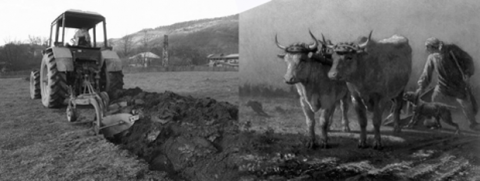The very sharp seasonal fluctuations in the prices of many agricultural products in Georgia are indicative of the state of the Georgian agricultural sector. Agriculture provides a safety net for a very large number of jobless people who might otherwise be starving, and thus serves a very important social function. However, many of those employed in agriculture are individual subsistence farmers, lacking in skills and resources to move to the next level in terms of productivity.
Small farmers all over the world have a hard time coping with the risks inherent in agricultural production – risks that are as much about weather and deceases, as they are about the ability to sell at a fair price. In most developing countries, including Georgia, these challenges may be further exacerbated by low public spending on technology and infrastructure, and by inadequate institutions.
A steep increase in agricultural commodity prices during the past few years has fueled a global rush for agricultural land. A recent article in the IMF blog suggests that in 2009 alone cross-border land deals finalized or under negotiation involved at least 56.6 million hectares! Some commentators welcome these transnational purchases as an opportunity to overcome decades of underinvestment, to create jobs, and to bring new technology to developing countries. Others, though, denounce the transnational investments as a “land grab,” neglecting local rights, extracting short-term profits at the cost of long-term environmental sustainability, neglecting social standards, and fostering corruption on a large scale.
The recent arrival to Georgia of Boer farmers is perhaps a part of this global trend. As discussed in the ISET Economist Blog (see this post by Michael Fuenfzig), confronted with the dire situation in the agricultural sector, the Georgian government invited the Boer to immigrate and to invest in Georgia. The hope is that the capital, agricultural expertise and management knowhow of the Boer will trigger a process of land consolidation and technological progress in the Georgian agriculture.
Importing the Boer know-how to Georgia may be a good idea in its own right. However, there is also a great need and an opportunity to make the traditional small-scale Georgian agriculture more efficient by creating the kind of environment under which small farmers could cooperate and thrive.
Indeed, land consolidation is not a necessary condition for achieving efficiency in many types of agricultural production. As Rabah Arezki, Klaus Deininger, and Harris Selod write in the IMF blog, "many technological innovations are not particularly scale biased. Information technology, for example, which can be used to better control a large farm, can also be used by small farmers to coordinate their efforts. Moreover, very large units of production often emerge because they can deal with market imperfections (access to finance), lack of public goods (infrastructure, education, or technology), and weak governance better than small ones. But, in a competitive and transparent environment where public goods are effectively provided, much smaller operational farm sizes could prevail. Indeed, anecdotal evidence suggests that, in many settings, farms are very large not because of inherent advantages of the technology but because of the superior ability of large operators to deal with market imperfections."
At present, individual Georgian farmers engaged in primary agricultural production are exempt from VAT, but farmer organizations are not. No wonder, therefore, that the Georgian farmers have so far preferred to act as individuals when selling their products to wholesale dealers and processing plants. Some pundits have blamed this "individualism" on the scars left by the Soviet kolkhoz experience, but there is really no need to blame every failure on the Soviets. People respond to incentives, as simple as that.
An excellent piece of news is that the tax environment in which the small Georgian farmers operate is about to change very soon. A new legislation, now in the final stages of preparation, will exempt primary agricultural production from VAT. This means that small farmers would no longer face a tax disincentive when forming service cooperatives to help them deal with market imperfection and inadequate infrastructure.
















Comments